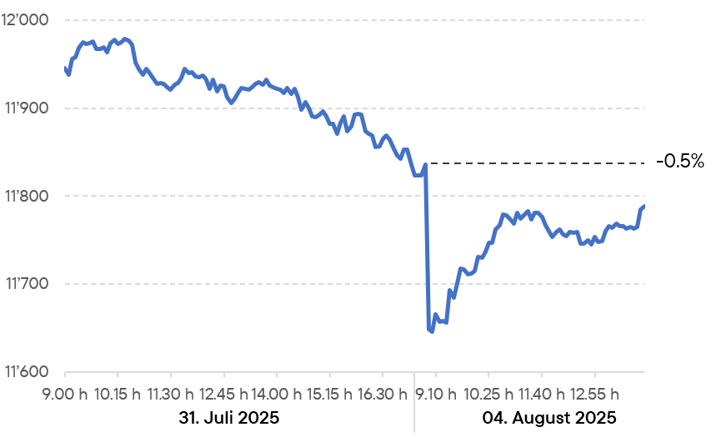
IC No. 42 - The ghost of tariffs
After individual media had warned of a Black Monday on the Swiss Stock Exchange, it can be said from today's perspective that the market reaction to the 39% tariffs announced by Trump was mild.
After individual media1 Warned of a Black Monday on the Swiss Stock Exchange, it can be said from today's perspective that the market reaction to the 39% tariffs announced by Trump was mild.
Black Monday?
Market reaction to announced US tariff development SMI in points 31 July to 4 August 2025


It can be assumed that market participants were somewhat more careful with regard to high-export stocks even before the announcement and thus anticipated part of the market reaction. At the same time, the probability that a negotiated settlement will still be reached is highly estimated. In any case, the market is highly differentiated: stocks without a high export share such as Swisscom (+2.3%), Zurich Insurance (+0.3%), Swiss Life (+0.3%) and Swiss Re (+0.1%) win. By contrast, export-intensive companies such as Swatch (-2.8%) or Richemont (-1.4%) are coming under increasing pressure.2
Facts
Switzerland exports 16% of its goods to the USA — a large but manageable share of total global exports.3 Switzerland's trade surplus with the USA amounts to CHF 39 billion. If gold and pharmaceutical exports are excluded (for which there is a risk of a separate tariff regime), the surplus shrinks to a manageable CHF10-15 billion. The tariff of 39% affects just 5% of Swiss exports. A very unpleasant situation, but not the end of the world for Switzerland. The USA also benevolently ignores the fact that Switzerland has a deficit of around CHF 20 billion in the area of services compared to the USA.4
A large part of the “export surplus” is due to gold exports. This is due to the fact that Switzerland is the world's largest location for gold refineries. The actual added value in the country through the remelting of gold is much lower, but the absolute value of the goods is very high.
Other facts are also interesting: In January 2024, Switzerland abolished all industrial tariffs and is now considered one of the most cosmopolitan economies. 99.3% of all goods from the USA can be imported into Switzerland duty-free.5 It is therefore surprising that Switzerland was unable to reach an agreement with the USA. We can only speculate that the Swiss position showed that there is barely a deficit and that the USA wanted to present a negotiating trophy despite everything. To prove its goodwill, Switzerland could, for example, impose the 4% tariff on the import of US cars or (and much more politically sensitive) tariffs on agricultural products. All in all, there is enough room for good cooperation.
Conclusion
The market reaction was significantly more moderate than was feared over the weekend. Resilient companies can be found in the technology and financial services sectors (e.g. insurance and stock exchange operators). Companies from the industrial, luxury goods and pharmaceutical sectors are coming under pressure.
At the same time, the cow is not off the ice. All in all, however, it is clear that the world (and therefore investors) have learned to deal with the fact of higher US tariffs. Unfortunately, we now live in a multi-polar world, in which the old hegemon is trying to secure its position by all means possible. On the other hand, parallel structures and innovative ideas will develop that counteract this eagerness.
Once again, it's time to keep calm in times of turmoil.
PC
[1] https://www.cash.ch/news/top-news/fur-den-smi-zeichnet-sich-schwarzer-montag-ab-die-aktien-ubersicht-an-der-vorborse-848587
[2] Values of Swiss Stock Exchange SIX as of press time on 4.8.2025, 1 pm
[3] State Secretariat for Economic Affairs (SECO)
[4] State Secretariat for Economic Affairs (SECO)
[5] https://www.seco.admin.ch/seco/de/home/Aussenwirtschaftspolitik_Wirtschaftliche_Zusammenarbeit/Wirtschaftsbeziehungen/usa.html